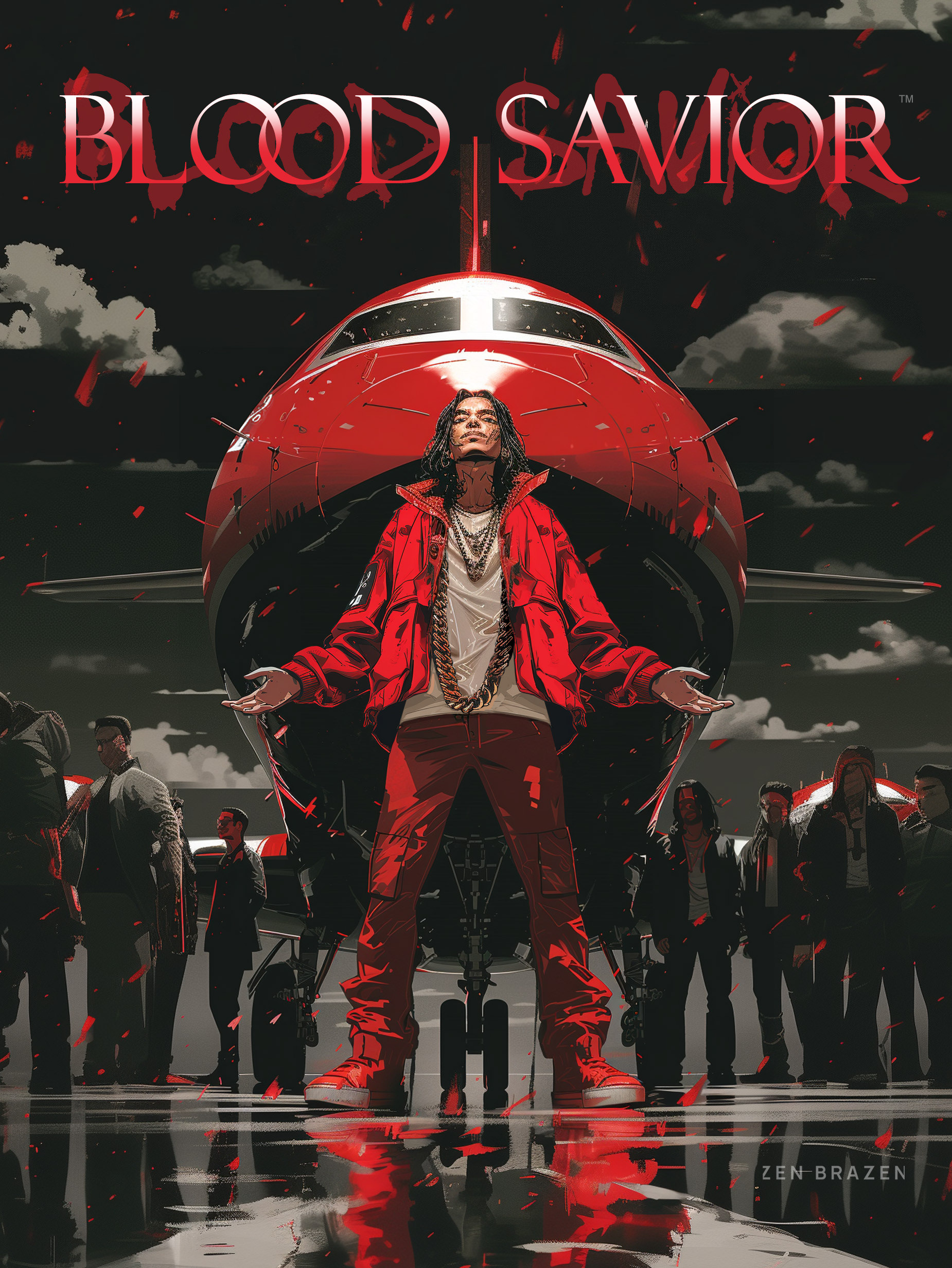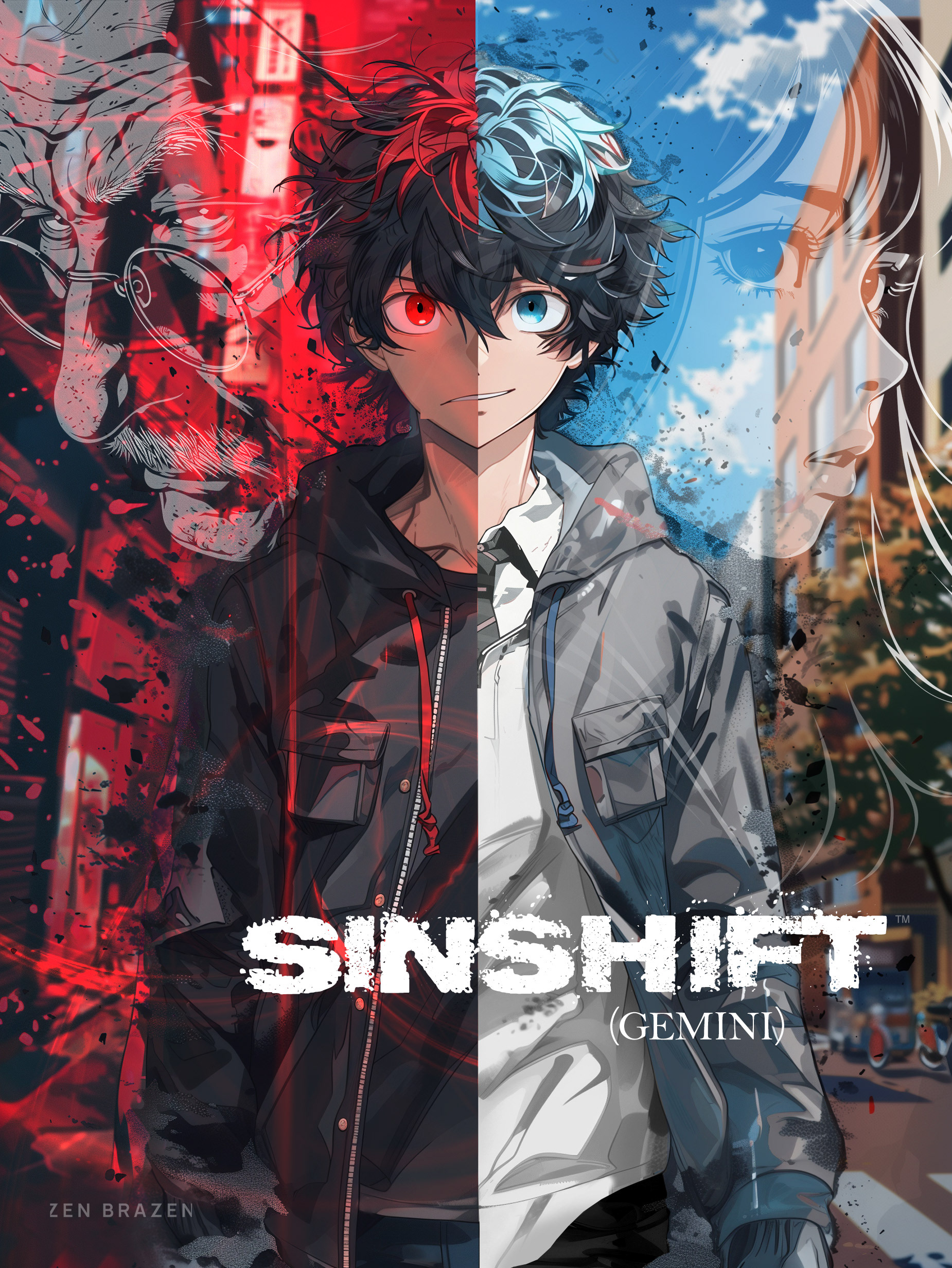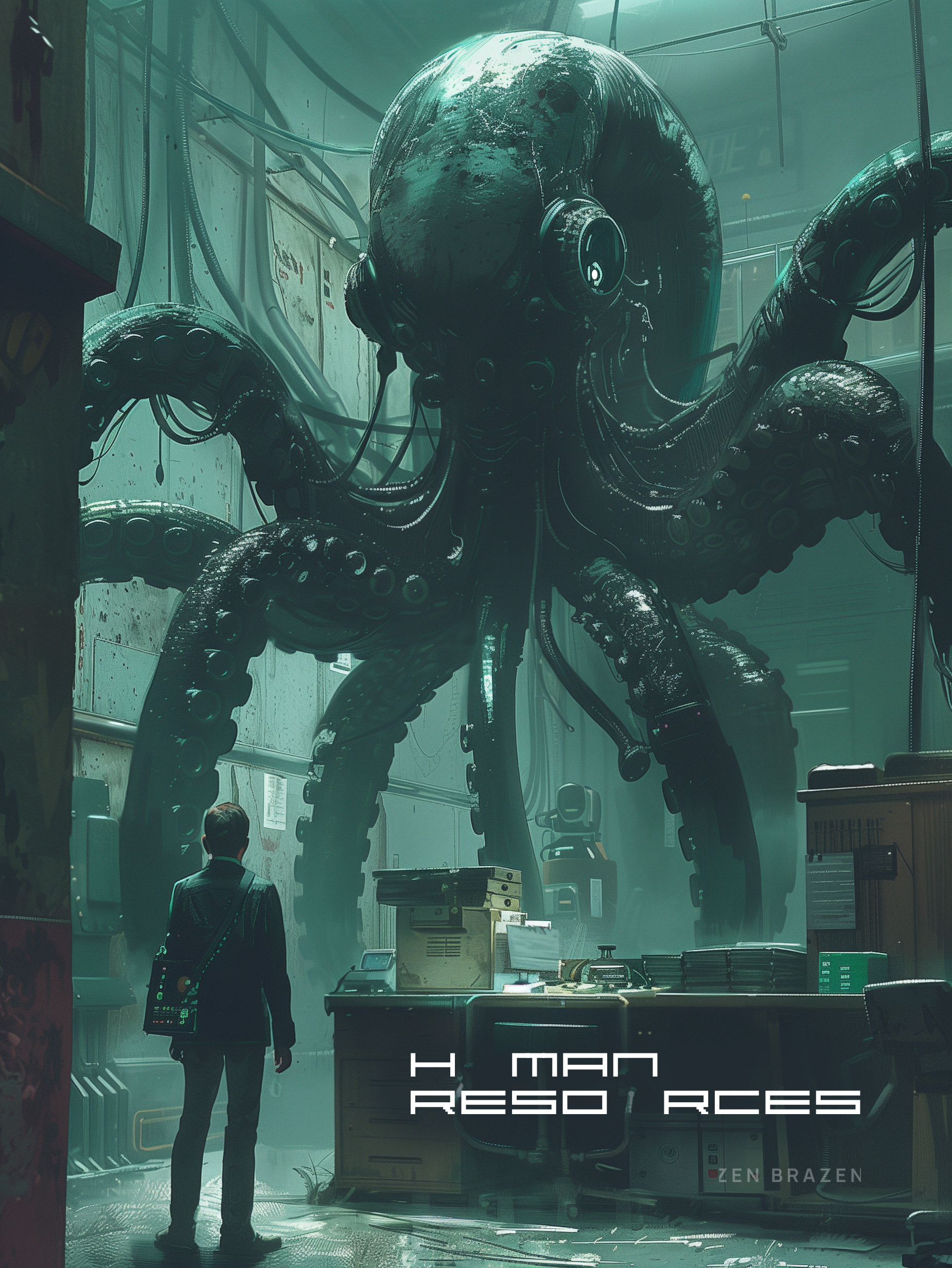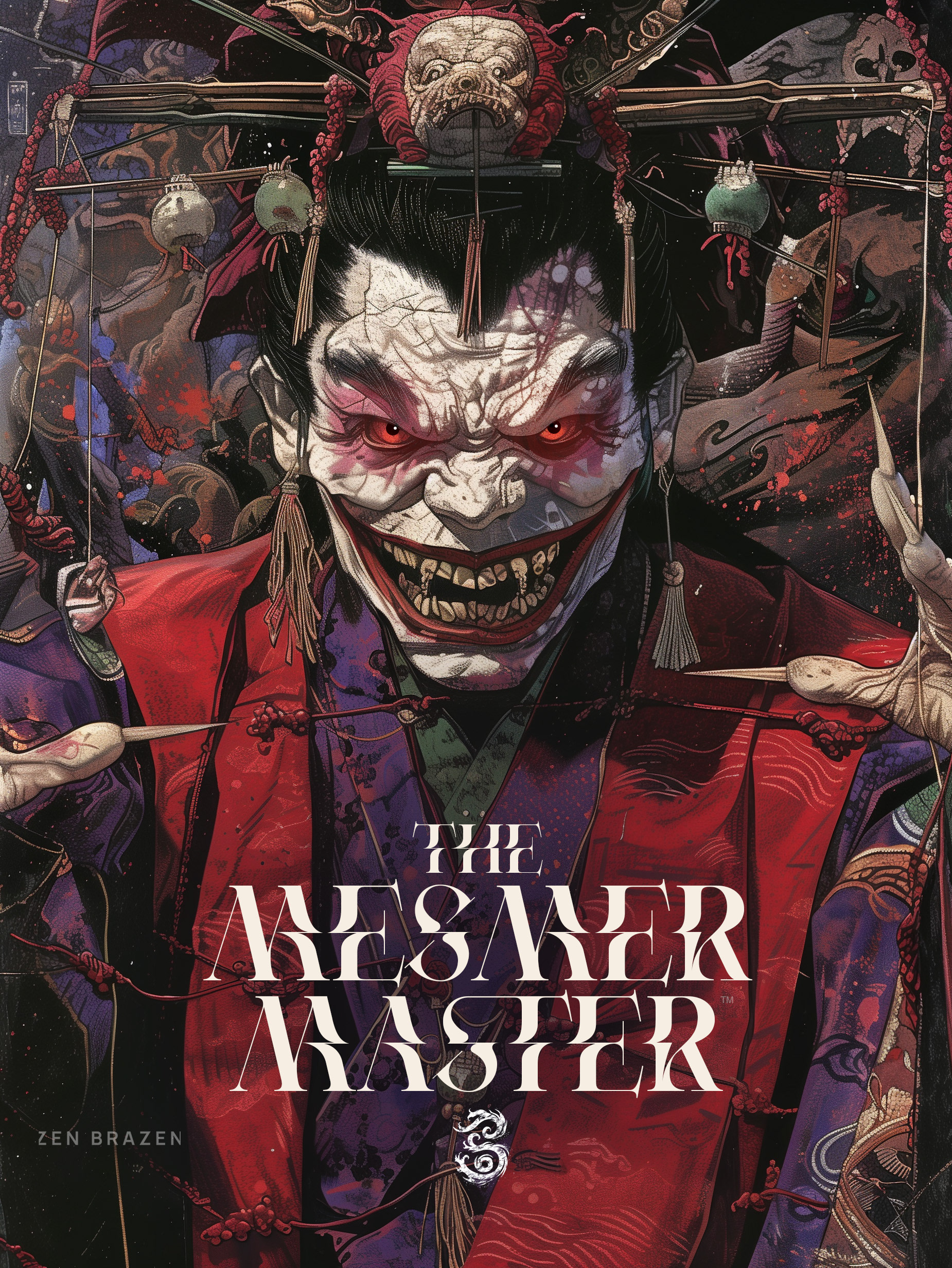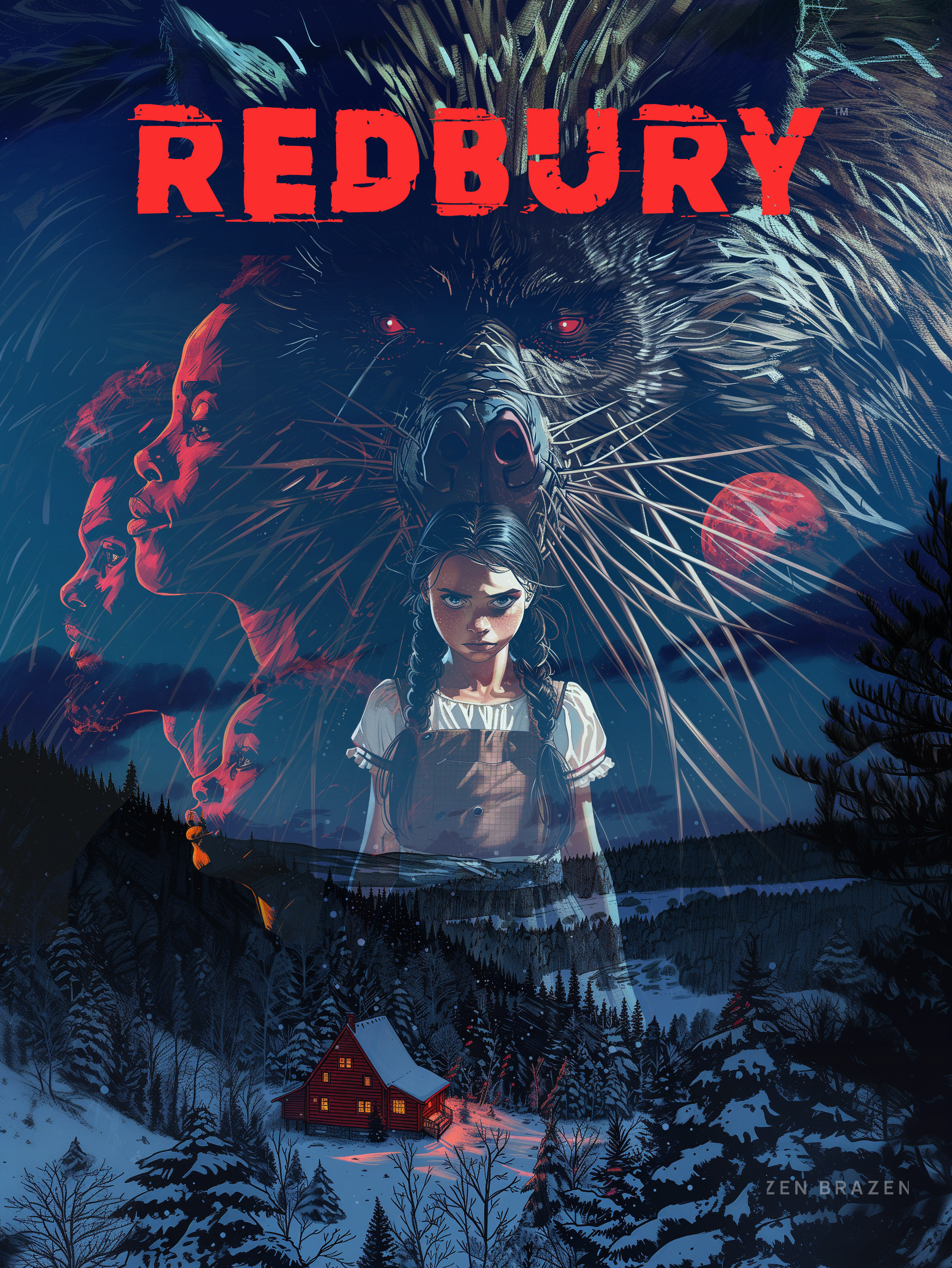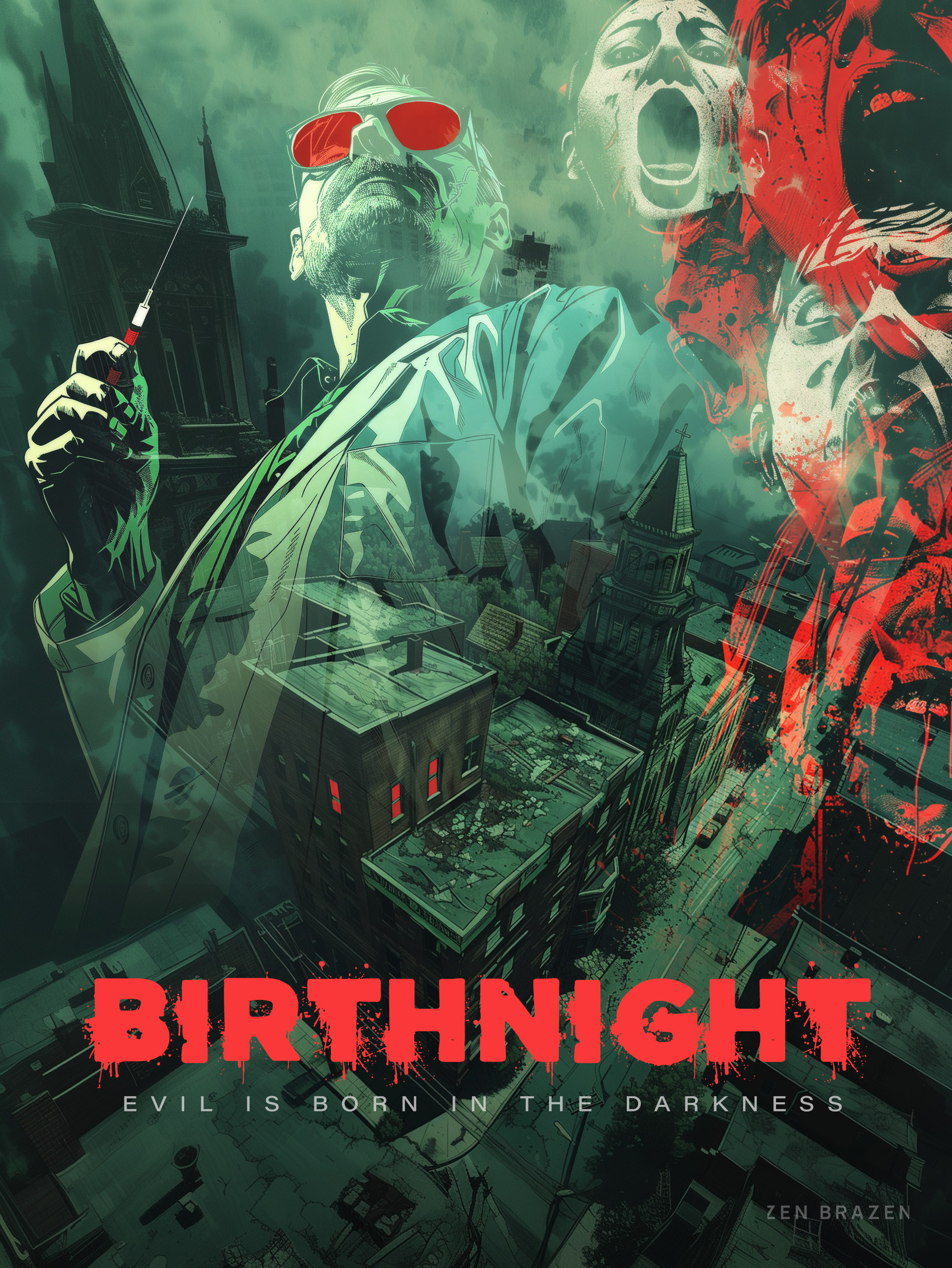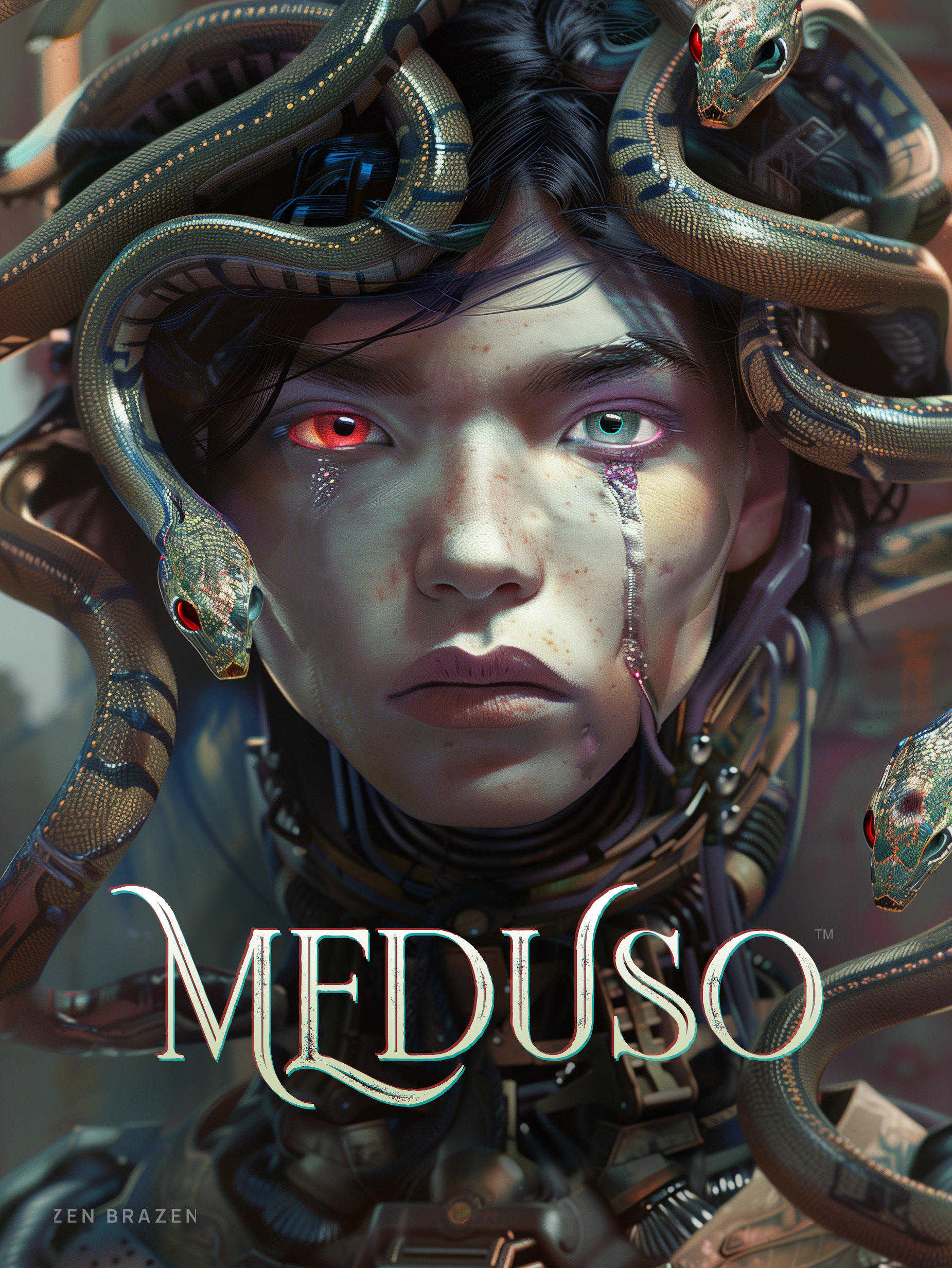On Afrique, the last continent on Earth, the sun no longer shone with the whiteness of its prime, but was dim and tarnished as if with a vapor of blood. New stars had declared themselves in the heavens, and the shadows of the infinite had fallen closer.
Out of the shadows, the ancient, long forgotten gods had returned to man. The elder demons had also returned, feasting on the fumes of evil sacrifice, and fostering again the primordial sorceries.
Among the necromancers and magicians across all of Afrique, there was none greater than Avlon, who imposed his black yoke on the greatest Southern cities, and in a proud delirium, deemed himself the peer of the demon god Apophis himself.
Avlon had come from the desert realm of Tasuun with the rage of a desert sandstorm and constructed his vast abode in the former Southern capital, which he would rename Vengefall. And no man knew that in coming to Vengefall he had returned to the city of his birth.
None could have dreamt that the great sorcerer Avlon had grown up in former Vengefall, and was known as the beggar-boy Lonny, an orphan of questionable parentage, who had begged for his daily bread in the streets and bazaars of the city. Lonny had lived a wretched existence, alone and despised, and a hatred of the cruel, opulent city grew in his heart like a smothered flame that feeds in secret.
One day, thirteen years after his birth, Prince Zotulla of the Southern realms, a boy only little older than himself, riding atop a nervous and volatile steed, came upon Lonny in the square in front of the Imperial Palace.
Lonny implored Prince Zotulla for a coin or two for some bread. But Zotulla, scorning his plea, rode arrogantly forward, spurring the steed which knocked Lonny onto the ground. Lonny was then trampled under the hooves of one of the Prince’s equine entourage. Near death from the trampling, he lay senseless for many hours, while citizens in the square passed him by with no concern.
Regaining his senses, Lonny dragged himself to his lean-to shelter on the outskirts of the city. Thereafter, he walked with a slight limp, and the mark of one horse’s hoof remained like a brand on his purple-skinned leg, all his days.
Lonny left Vengefall a year later, and was quickly forgotten by its people.
Going southward into Tasuun, he lost his way in the great desert, and was near to perishing. But finally, he came to a small oasis, where dwelt the hermit wizard Oaloc. Seeing the great rage and cleverness in Lonny, Oaloc gave food and shelter to the slight boy.
Lonny dwelt for years with Oaloc, becoming the wizard’s pupil. Strange, unnatural things Lonny learned under the wizard’s care.
As the years went by, he became a master in the darkest of arts. And when Oaloc finally died, Lonny took the name of Avlon, and went forth as a mighty sorcerer among the wandering peoples of the Tasuun desert.
But never could Avlon forget the miseries of his boyhood, and the wrong he had endured from prince Zotulla. Year by year he spun over in his thoughts the black web of revenge. His infamy grew ever darker and vaster. Men feared him in faraway lands, past the desert of Tasuun, all the way to Vengefall and beyond.
In the years that paralleled the exit of the boy Lonny from Vengefall, prince Zotulla, following the mysterious death of his father, the adored King Zalatan, ruled his domain from his throne in what would become Vengefall.
The new King was a tyrant, his kingdom full of strange luxuries and cruelties. He prospered, and tales of his brutal antics traveled far and wide across Afrique. His palace and grounds were the highest and most lavish in Vengefall. Zotulla’s presence and power were unrivaled by the scores of weaker reigns and families in the realm.
Zotulla begat a son from his wife, the Queen Lunia, that they named Zotol. When the boy was twelve, Lunia mysteriously disappeared one day and was never heard from again.
Years later, when Zotol was in his eighteenth year, and Zotulla himself was of middle-age, their influence and lives would be forever disrupted by the return of Avlon to Vengefall.
One night, King Zotulla heard a confused ruckus, a clamor of voices from his guards, eunuchs and various women that had awakened before him. Still bemused with the previous night’s wine and dizzy slumber, his favorite concubine, Obexah—a young woman only a year or two older than Zotol—pulled him out of his satin quiltings and led him to the Eastern portico of the palace, from which he could behold the marvel with his own eyes.
Where there had been a modest cathedral and a collection of low-rise buildings, a massive palace now stood alone in the center of Vengefall. To the North, West and South stretched imperial gardens, full of impressive statues, palms and topiary, and arcing fountains. And to the East was a collection of domed buildings, reaching even higher than those of Zotulla’s palace, with columned porticos and deep balconies, wrought in death-white marble and night-black onyx ribboned with red, jagged streaks the color of dragons’ blood.
Zotulla swore and cursed the gods, dumfounded, deeming the marvel a work of wizardry.
“Who is this that has presumed to enter Vengefall like a jackal in the dark,” Zotulla yelled, “and has made his palace in proximity to mine, and ruined my unobstructed view?”
Those gathered looked at each other and at their King in stunned and uninformed silence.
“Go forth,” Zotulla continued, “and inquire the miscreant’s name. And instruct the headsman to make sharp his double-handed sword!”
At sunrise, Zotulla’s agents went forth unwillingly and approached the portals of the new, mysterious palace. There appeared a titanic skeleton, five-times taller than any man of Afrique. Swathed in a loin-cloth of scarlet silk, it wore a diamond-studded black turban, and had fiery eyes. A blackened tongue like that of a long-dead man protruded between its teeth.
“Return, and tell the King Zotulla that Avlon, conjurer and magician, has come to dwell beside him,” the skeleton roared.
Hearing the skeleton speak, and hearing the dread name of Avlon, the agents trembled and fled swiftly, and bore the message to Zotulla.
Learning who it was that had come to neighbor with him in Vengefall, Zotulla’s wrath died out like a feeble and blustering flame on which the wind of darkness had blown.
“How dare this devil crowd our domain and frighten our people,” the impatient Zotol exclaimed. “An attack on the intruder should be forthcoming!”
“You are your Mother’s son, impetuous and hotheaded,” Zotulla replied to his son. “If you had any notion of the mystic and perplexing powers and reputation of Avlon, you would not utter such foolish, reckless things.”
Rumors circulated through Vengefall, like a strong desert wind, that Avlon’s palace had been raised in an hour with the aid of devils, that the foundations of the house were laid atop pits at whose bottom burned the nether fires, and that the palace had been constructed by the dead of strange, remote kingdoms, the demons of sky and earth, and mad, hybrid things that the sorcerer himself created from forbidden unions.
Avlon remained within the walls of the palace which his devils had built for him, and spun over and over in his thoughts the black web of revenge, and the wrong done by Zotulla to him when he was a mere boy named Lonny.
Several suns rose and nights fell, and all was still and silent, as Zotulla, his agents, and the citizens of Vengefall were undisturbed by Avlon or the new palace. Still, its presence was always in the back of mind, looming like the calm before a storm.
Then, one night at midnight, lying in his chamber with Obexah, and fathom-deep in his slumber from the evening’s wine, Zotulla was jolted awake by a monstrous clangor of hooves that thundered through the palace porticoes and in the long balconies and across the palace roof. All night the din of the hooves echoed through the vaulted stone, while Zotulla and Obexah—with no desire for carnal passions—huddled close amid their satin cushions and covers.
All the occupants of the palace, awake and fearful, heard the noise but dared not emerge from their chambers.
The next morning, in the silence of daylight, the marks of the horse’s hooves were found everywhere: on the porches and balconies, in the halls, marring the bright mosaic floors, burnt into the golden-threaded rugs, across the high domes of the palace, and even on the door of Zotulla’s bedchamber. The marks were countless, deep-graven, and black as if branded there by flame.
After a week of this onslaught of terror, and many sleepless nights, Zotulla called upon a delegation of wizards and prophets—under threat of decapitation if they refused—to visit Avlon in his palace of sorcery and learn his will. Reluctantly, the delegation moved towards Avlon’s portals and vanished into the devil-built palace.
Pale, muttering and distraught, like men who have looked upon hell and have seen their doom, they returned before sunset to their King. Their representative said that Avlon had received them courteously and had sent them back with this message:
“Be it known to Zotulla that the haunting is a sign of that which he has long forgotten, and that the reason for the haunting will be revealed to him at the hour prepared and set apart by destiny, at a great feast on the afternoon of the morrow.”
Having delivered this message, the delegation of prophets and magicians passed like furtive shadows from Vengefall. No man saw them depart, and at sunrise they were gone into other lands, never to return.
. . .
Zotulla was awakened the next morning by harsh daylight that was poisoned by the thought of that invitation which he feared to accept or decline.
“Who is this wizardly mongrel,” Obexah said, with her smooth face and dark hair draped across his chest, “that you should obey his summons like a street beggar?”
Like his son Zotol, Obexah had little knowledge of Avlon, and so was ignorant and brazen in her words. But Zotulla knew then that he had no choice. He would have to take an audience with Avlon, and face whatever outcome destiny had in store.
As the sun set that afternoon, an army of tall, grotesque mummies, clad in royal cerements of scarlet and glowing blue eyes, followed by a half dozen gigantic skeletons with loin-cloths of orange and crowns made of undulating live serpents, marched into Zotulla’s hall.
“All is made ready, and the feast awaits the arrival of Zotulla,” the mummies all said in unison.
Like a dreamer who obeys the doom of dreams, the emperor rose from his throne and went forward, the mummies surrounding him like an escort. Each of the skeletons withdrew archaic silver flutes from their loin cloths.
A spell was in the music, for all of Zotulla’s entourage, prepared to accompany him to Avlon’s palace, were frozen in place. Only his son Zotol and the beautiful Obexah followed behind Zotulla, walking slowly out of the castle and down into the streets of Vengefall. The trio was surrounded by the mummies and skeleton flutists, their movement forward compelled by the tune that lilted through the streets, which were packed with silent onlookers.
Coming to the open portals of Avlon’s palace, Zotulla marveled at the vastness of the place. He and Zotol and Obexah, and the procession of mummies and skeletons, ascended and entered into a massive hall, where the waning daylight was drowned by the arrogant blaze of a thousand lamps. A vista of tables laden with an array of foods and thronged urns of wine stretched away before him into the luminous distance.
Cadavers in robes of time-rotted brocade, with worms seething in their eye-pits, poured a blood-like wine into cups of the opalescent horn of unicorns. Dog-headed devils, tongues aflame, came in with fuming platters of meats lifted high by their brazen claws.
Far away at the room’s end, Avlon sat alone, with the flames of the seven horse-skull lamps burning restlessly behind him. He rose to greet them, his eyes bleak and cold as distant stars, his beard flowing stiffly in banded locks across his vermilion robe, like a mass of straight black serpents.
Zotulla felt the blood pause and thicken about his heart, as if congealing into ice.
“I bid you welcome, Zotulla, to such hospitality as is mine to offer,” said Avlon, with the iron ringing of some hidden funeral bell deep down in his hollow voice. “Be seated at my table, and enjoy the finest food, libations, music and hospitality in all of Afrique.”
It seemed then that several hours swirled by in a spinning spectacle of hellish feasting and entertainment. Steaming, blood-rare meats of unknown beasts followed by gulps of a strange wine that was red and dark as if with disastrous sunsets of lost years. A choir of she-ghouls with shaven bodies and hairy shanks emitted a most grief-striken howling, as of jackals that have sniffed their carrion. An orchestra of devils, plucking with boney fingers at lyres of the bone and sinew of slaughtered cannibals, played a lament that was like the moaning of desert-born winds through forsaken palace harems. A troupe of skeletons pirouetted with thudding feet that wrought thunder in the room, danced as if they trampled rotten grapes for an autumn vintage, and the floor ran deep with a sanguine must.
It was then that Zotulla’s own body was at war, the glowing warmth of the strange wine in mortal conflict with the growing chill in the marrow of his bones, contemplating what the demented Avlon could possibly subject them to next.
“Now that I have given my friend Zotulla, his son and his whore all that I have,” boomed Avlon, “it is time for the long-awaited taking. Behold!”
Zotulla, Zotol and Obexah rose from their chairs against their will, in the fashion of dazed somnambulists. They moved toward a broad, high balcony that faced Zotulla’s palace and looked forth above the city roofs toward the dying sunset.
“Look well on the empire that was yours,” commanded Avlon. “It shall now be known as Vengefall, and shall be yours no longer.”
Instantly, a herd of gigantic stallions, racing with inconceivable speed, began to blot the green fields and fruited orchards lying for many miles to the West, until their shadows climbed like an evil gloom and their hooves descended upon Vengefall. Far below, in the darkened streets, men and camels fled like scurrying rodents but could not escape. Temple-domes, haughty mansions and common houses were trampled and crushed, until ruin was upon half the city.
And Zotulla—with Zotol and Obexah next to him—then watched in horror as his own palace was trodden under, until every dome, building, spire and garden across the breadth of his entire domain was destroyed.
As the cataclysmic clamor of the hooves departed toward the other half of Vengefall, the three were turned back around toward the great hall. In mere moments, a swirling red mist engulfed the room, and when it lifted, the hall was completely empty, save for Avlon who stood in the middle of the great space.
“Now that was a worthy spectacle. But think not that I am done with thee,” Avlon declared. “Know, Zotulla, that I summoned the stallions of the lord of the abyss, Apophis himself, to tread your empire down. Just as your princely steeds trod and trampled in a distant time, in this very city, a beggar-boy named Lonny. Know now, Zotulla, that I was that boy.”
“Oh, great Avlon,” Zotulla cried, falling to his knees. “I was a foolish prince, vain and selfish. If I caused you any pain or harm, all these years ago, I will spend the rest of my mortal life apologizing and making amends for my careless misdeeds.”
As if he hadn’t heard word of what Zotulla had said, Avlon waved his hand. Between him and Zotulla appeared a transparent, conjured scene of silent horror. The young Prince Zotulla stood in front of his father, the late King Zalatan. And in one swift movement, the Prince stabbed his father in the chest. The elder fell, and the prince descended on top of his father, plunging the dagger into the elder’s chest eight more times.
“Is this apparition true, father?” the young Zotol asked his father. “You killed your father, my grandfather?”
Zotulla, stunned into silence, rose from his knees back to a standing position, while averting his son’s fiery gaze.
Before any more could be said, the ghostly scene was replaced by a quick series of apparitions. King Zotulla could be seen putting a substance into a chalice. His betrothed, Queen Lunia took a sip from the chalice. Then, in the most gruesome of scenes, Zotulla picked up Queen Lunia’s body off the stone floor, carried her to a spire window and pitched her body out.
“Father!” Zotol wailed, salty tears rolling down his purple cheek. “You told me my Mother departed one day, never to return. Is this despicable vision true? Did you kill my Mother?”
“Zotol, my son,” Zotulla replied. “You must understand—”
Zotulla watched in horror as his son came toward him, but the gaze of Avlon somehow held him in place, so he was unable to evade the onslaught. The young Zotol lunged at his father, plunged a dagger into his neck, and rode him to the floor, plunging the dagger repeatedly until his father was a lifeless, bloody mass.
Avlon’s incantation also rendered Obexah mute and stationary as she watched the scene before her, the violent actions of Zotol stirring in her not revulsion at the brutal death of her lover, but a dark and carnal yearning for the young man who would now be king.
“Vengeance and justice are naked, intimate partners today,” Avlon said. “May the name Zotulla be spoken across Vengefall only by those who wish a similar fate.”
And with that, Avlon vanished, leaving Zotol, Obexah and the carcass of Zotulla alone in the great hall.
For the ten years that followed, the city of Vengefall rebuilt. Following the burial of those massive numbers of citizens killed in the path of Avlon’s stallions of vengeance, the city slowly returned to normal. Year after year, there was healing and rebuilding, memorials for those who had died, and expressions of gratitude by those who had survived.
Zotol became the King of his realm among the rubble and destruction of his father’s former palace, and vowed to rebuild a larger and more impressive palace than had stood before. Obexah awoke in him the manhood that had slumbered unaroused before the death of his father. Her passionate and carnal moans echoed throughout the rising walls of the new palace, and brought her new King a son they called Zenith, and eventually two daughters, Zen and Zail.
Avlon’s palace remained in the center of Vengefall for the rest of the era. The conjurer and magician was rarely seen in the city, and rumors placed him across the width and breadth of Afrique, exerting his devious will and unparalleled powers to his advantage.
Despite his selfish and treacherous deeds of destruction that continued for the rest of his long life, sightings and rumors had the mighty Avlon always in possession of a sack of golden coins, passing them out liberally to needy and downtrodden children who would cross his path…
so that they may have a modicum of hope and dignity, as well as their daily bread.
(based on The Dark Eidolon (public domain) by Clark Aston Smith)

